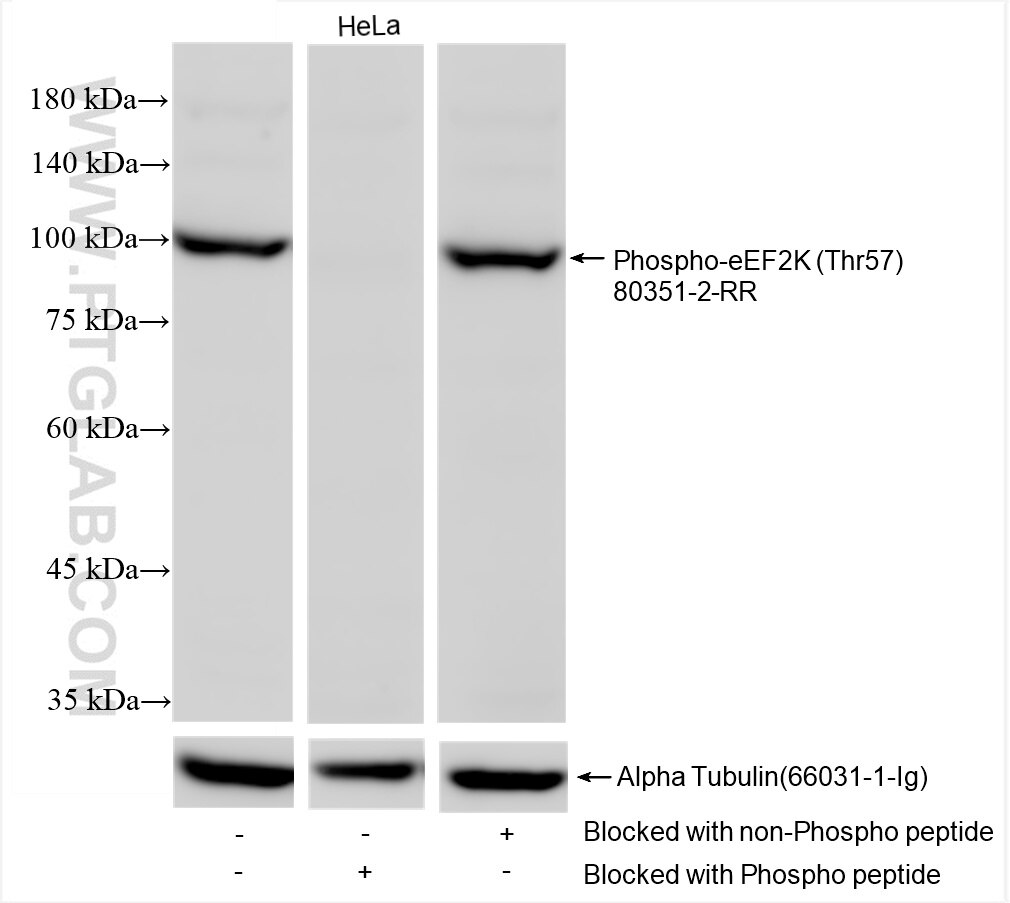Tested Applications
| Positive WB detected in | HeLa cells |
Recommended dilution
| Application | Dilution |
|---|---|
| Western Blot (WB) | WB : 1:1000-1:4000 |
| It is recommended that this reagent should be titrated in each testing system to obtain optimal results. | |
| Sample-dependent, Check data in validation data gallery. | |
Product Information
80351-2-RR targets Phospho-eEF2 (Thr57) in WB, ELISA applications and shows reactivity with human samples.
| Tested Reactivity | human |
| Host / Isotype | Rabbit / IgG |
| Class | Recombinant |
| Type | Antibody |
| Immunogen |
Peptide Predict reactive species |
| Full Name | eukaryotic translation elongation factor 2 |
| Calculated Molecular Weight | 858 aa, 95 kDa |
| Observed Molecular Weight | 100 kDa |
| GenBank Accession Number | BC126259 |
| Gene Symbol | EEF2 |
| Gene ID (NCBI) | 29904 |
| Conjugate | Unconjugated |
| Form | Liquid |
| Purification Method | Protein A purification |
| UNIPROT ID | P13639 |
| Storage Buffer | PBS with 0.02% sodium azide and 50% glycerol, pH 7.3. |
| Storage Conditions | Store at -20°C. Stable for one year after shipment. Aliquoting is unnecessary for -20oC storage. 20ul sizes contain 0.1% BSA. |
Background Information
eEF2 (Eukaryotic Elongation Factor 2) is a key component in the process of protein synthesis in eukaryotic cells. It is a GTP-binding protein that plays a crucial role in the elongation phase of translation. Specifically, eEF2 facilitates the movement of the ribosome along the mRNA, allowing the addition of amino acids to the growing polypeptide chain. This elongation factor is essential for efficient and accurate protein synthesis. Interestingly, eEF2 phosphorylation can either be increased or decreased depending on the stimulus used in learning or synaptic plasticity paradigms. Examining the specific contributions of increases and decreases in eEF2 phosphorylation to learning and memory is difficult. (PMID: 25762683)
Protocols
| Product Specific Protocols | |
|---|---|
| WB protocol for Phospho-eEF2 (Thr57) antibody 80351-2-RR | Download protocol |
| Standard Protocols | |
|---|---|
| Click here to view our Standard Protocols |




